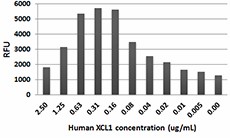- Regulatory Status
- RUO
- Other Names
- Lymphotactin, Ltn, ATAC, SCYC1, SCM-1, SCM-1a, lymphotaxin

-

Human XCL1 chemoattracts Baf3-hXCR1 transfectants in a dose dependent manner.
| Cat # | Size | Price | Quantity Check Availability | ||
|---|---|---|---|---|---|
| 758002 | 10 µg | $153.00 | |||
| 758004 | 25 µg | $265.00 | |||
Select size of product is eligible for a 40% discount! Promotion valid until December 31, 2024. Exclusions apply. To view full promotion terms and conditions or to contact your local BioLegend representative to receive a quote, visit our webpage.
XCL1, also known as lymphotactin, is an inflammatory chemokine secreted by T cells and natural killer (NK) cells. Early reports described XCL1 as a mediator of T cell and NK cell migrations, but recent studies suggest a highly specialized role for XCL1 and its receptor XCR1. The XCL1-XCR1 axis has been shown to play an important role in dendritic cell mediated cytotoxic immune response and in the formation of self-tolerance mechanisms through the development of regulatory T cells within the thymus. XCL1 also acts as a conformation-dependent inhibitor of HIV-1. Unlike other chemokines, XCL1 conformation interchanges between conserved chemokine folds and an unrelated dimeric structure under physiological conditions. The XCL1 monomer binds XCR1 with a high affinity, whereas the dimer form binds glycosaminoglycan (GAG) with high affinity, but fails to activate XCR1. Human XCL1 encodes a 114 amino acid precursor protein with a 21 amino acid signal peptide and a single disulfide bond.
Product Details
- Source
- Human XCL1, amino acids (Val22-Gly114) (Accession# P47992), was expressed in E. coli.
- Molecular Mass
- The 93 amino acid recombinant protein has a predicted molecular mass of approximately 10.3 kD.
- Purity
- >98%, by SDS-PAGE, HPLC, MALDI-MS, and NMR.
- Formulation
- Lyophilized powder.
- Endotoxin Level
- Less than 1.0 EU per µg of protein as determined by the LAL method.
- Storage & Handling
- Unopened vial can be stored at -20°C or -70°C. For maximum results, quick spin vial prior to opening. Reconstitute in water to a concentration of 0.1-0.5 mg/ml. Do not vortex. It is recommended to further dilute in a buffer containing a carrier protein such as 0.1% BSA and store working aliquots at -20°C to -80°C. Avoid repeated freeze/thaw cycles.
- Activity
- ED50 = 0.02 - 0.1 µg/mL as measured by its ability to chemoattract BaF3 mouse pro B cells transfected with human XCR1.
- Application
-
Bioassay
Antigen Details
- Structure
- Monomer and Dimer.
- Distribution
-
Spleen, peripheral leukocytes, CD4+ and CD8+ T cells, and natural killer (NK) cells.
- Function
- T cell and NK cell recruitment.
- Interaction
- T cell, NK cell, and Dendritic cells.
- Ligand/Receptor
- XCR1.
- Bioactivity
- Chemoattract BaF3 mouse pro B cells transfected with human XCR1.
- Biology Area
- Immunology
- Molecular Family
- Cytokines/Chemokines
- Antigen References
-
1. Kelner GS, et al. 1994. Science 266(5189):1395-9.
2. Kennedy J, et al. 1995. J. Immunology 155:203-209.
3. Volkman BF, et al. 2009. Methods Enzymol. 461:51-70.
4. Lei Y, Takahama Y. 2012. Microbes Infect. 14(3):262-7.
5. Guzzo C, et al. 2013. PLoS Pathog. 9(12):e1003852.
6. Kroczek RA, Henn V. 2012. Front Immunol. 3:14. - Gene ID
- 6375 View all products for this Gene ID
- UniProt
- View information about XCL1 on UniProt.org
